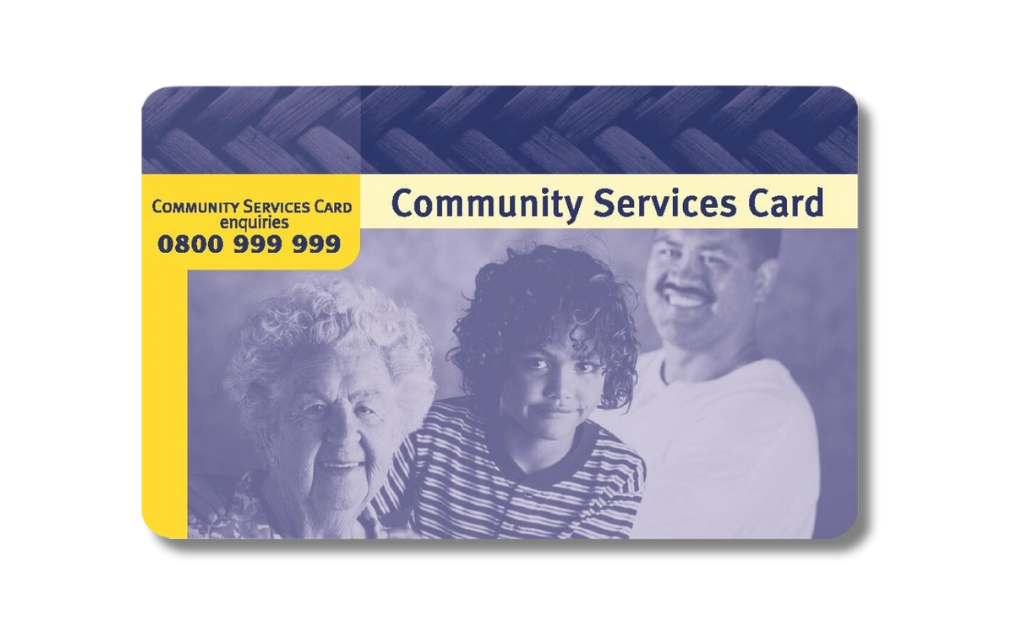
The standard $5 prescription co-payment is back as of 1 July 2024. This will affect most kiwis, however there are some exempt groups who do not need to pay this charge. In this article we will look at how you can get free prescriptions in New Zealand with a Community Services Card, who is eligible for the card, and how you can apply for one.

From 1 July 2024 your pharmacy may start charging you the standard $5 prescription co-payment per item. People aged 13 years or younger, and 65 years or older are exempt from this charge. If you are not in these age groups you may be able to avoid their prescription charges by getting a Community Services Card.
A Community Services Card (CSC) can help you and your family with the costs of healthcare and some other services. The card is supplied by Work and Income on behalf of the Ministry of Health to help lower the cost of healthcare for cardholders and their families. For those on regular medicines it can be a big cost saver, as Community Service Card holders are exempt from the standard $5 prescription charge – as are their dependent children under 18 years of age.
The CSC reduces the cost of prescriptions:
It also reduces the cost of:
You can find the full process on how to apply on the Work and Income website.
Step 1
To get your CSC you first need to get an application form by:
Step 2
You will need to provide 2 forms of proof of identity. People receiving NZ Super don’t need proof of identity. Learn more about what you need to provide when you apply for a CSC on the Work and Income website.
Step 3
Send your application form and documents to Work and Income using the address on the form. Work and Income will let you know if they need anything else.
Step 4
If your application is approved, Work and Income will send you a CSC. Your card will have a start date and an expiry date. You can continue to use the card until it expires – even if your circumstances change.
If you can’t get a CSC you can still lower your cost for prescriptions through the prescription subsidy scheme. Once you have paid for 20 prescription items from 1 February each year you are eligible – meaning you no longer need to pay any more prescription charges for the rest of that year.
You can reach this 20-item threshold quicker by combining prescription items for your partner, and dependent children aged from 14 to 18. Our pharmacy team can check to see how many prescriptions you and your eligible family members have paid for.
Many people who don’t fall into the age groups exempt from prescription charges may be eligible for a Community Services Card. Once common misconception is that you need to be on a benefit to qualify for a card – this is not true.
You may get the CSC if you:
It also depends on how much income you and your partner get. By income, we mean any money, goods and services you or your partner get from any source, such as:
You can find a full breakdown of income limits in the next section.
You may be able to get a card if you’re… | And your yearly income (before tax) is less than… |
Single – living with others | $33,181 |
Single – living alone | $35,213 |
Couple, no dependant children | $52,656 |
NZ Super, single, sharing accommodation | $35,283 |
NZ Super, living alone | $37,531 |
NZ Super, in a relationship, no dependant children | $56,327 |
Family of 2 | $64,316 |
Family of 3 | $79,167 |
Family of 4 | $91,332 |
Family of 5 | $103,281 |
Family of 6 | $116,434 |
For families of more than 6, the limit goes up another $11,802 for each extra person.
Family: in this table, a family includes either 1 or 2 adults and the dependent children they care for. For example, a family of 2 is made up of 1 adult and 1 dependent child. A family of 3, can be made up of either 1 adult and their 2 dependent children or 2 adults and 1 dependent child.
Written by Paul Taylor
Paul Taylor is a New Zealand–based healthcare content writer with 5+ years’ experience creating patient friendly articles for online pharmacies and health platforms. He specialises in accessible condition guides, prescription FAQs, OTC advice, and health & wellbeing tips, translating complex medicines or health condition information into clear, actionable content. Paul collaborates with the ZOOM Pharmacy clinical team and bases every article on authoritative sources, peer reviewed journals and national clinical guidelines to ensure evidence based, up to date content. His goal is to help readers feel empowered to make informed decisions about their medicines and wellbeing. This content is general information only and does not replace professional medical advice.